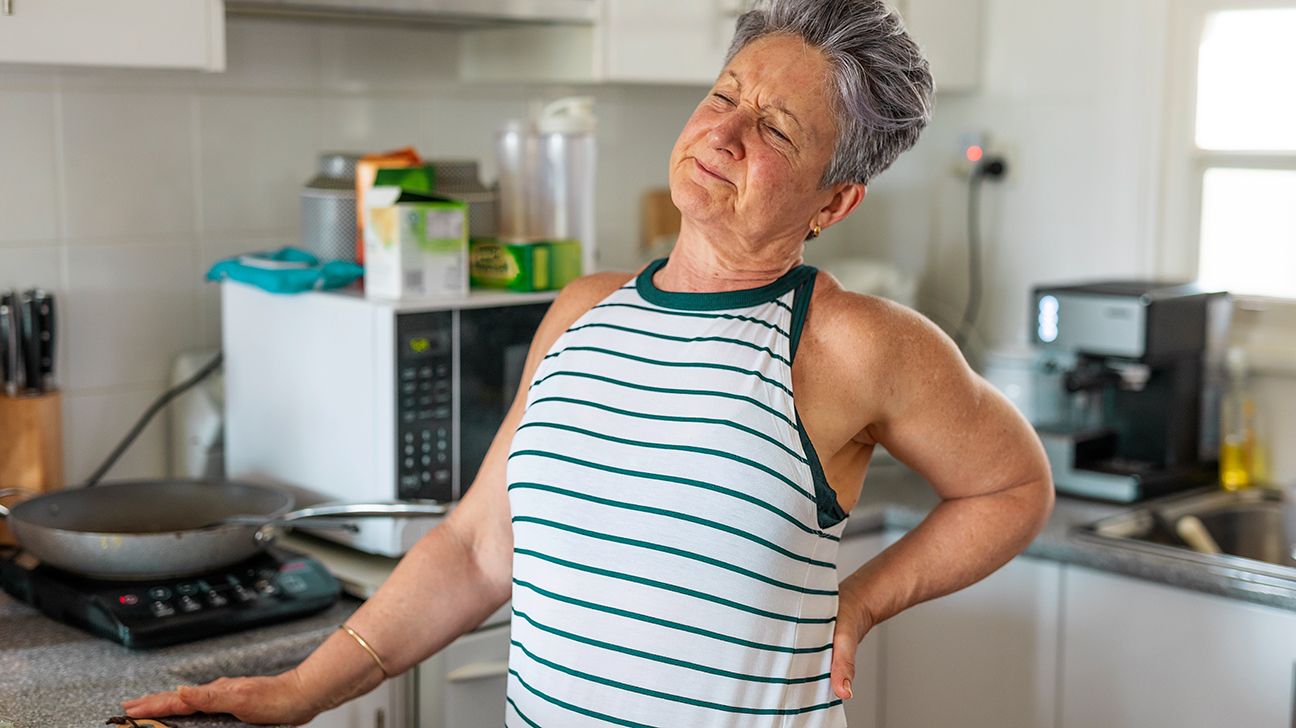Back pain when eating may have different causes, including digestive challenges like gastrointestinal reflux disease (GERD). If your back hurts shortly after eating, you may have referred pain from esophagus irritation. Other causes are still possible.

Back pain is often caused by muscle strain or arthritis in your spine. Nerve damage, kidney infections, cancer, and referred pain may also result in pain and tension along your back.
If your back pain only comes after eating, it may be related to a digestive challenge, including acid reflux. However, other acute and chronic conditions may also cause this symptom.
GERD is a chronic condition caused by persistent acid reflux. This refers to stomach acid moving back up into your esophagus (food pipe) causing a variety of inflammatory symptoms.
Back pain isn’t part of the diagnostic criteria for acid reflux or GERD, but it could happen to some people with the condition because of referred pain.
Referred pain occurs when you have a health challenge in one part of the body but feel it somewhere else. For example, you may have sciatica (pressure on the sciatic nerve at the hip level) and experience pain down your leg.
Eating may trigger GERD symptoms resulting from irritation in the esophagus. Some of the nerves innervating this area connect to the back, making it possible for you to experience referred back pain after eating.
If GERD is causing your back pain after eating, you may also have one or more of these symptoms:
- burning pain in the chest (heartburn)
- pain in the upper stomach
- burning sensation in your throat
- persistent sore throat
- tension and tightness in the throat
- shoulder pain
- belching
- shortness of breath
- acid and other stomach contents traveling back up your food pipe
- chronic cough
- fatigue and daytime sleepiness
- sour stomach
These symptoms, including back pain, may be present even when you’re not eating.
Read about heartburn relief and GERD treatment options.
Back pain may result from the following:
Common causes of back pain after eating may include:
Ulcers
A peptic ulcer can radiate pain to your back. This type of ulcer is a sore in your stomach or small intestine. Typical symptoms of a peptic ulcer may include:
- moderate to severe burning pain in the abdomen or lower chest
- sour stomach
- bloating
- nausea
- vomiting
- dark stools
- changes in your appetite
Posture
One of the most common causes of back pain is posture. If you sit hunched over your food during a meal, you may end up with soreness in your back. That same pain can develop if you’re hunched over your computer or if you maintain a slouched position most of the time.
The chair where you sit when eating a meal may also impact your back muscles and could lead to back pain and tension.
Kidney pain
Your kidneys are situated on each side of your torso and under the rib cage. Kidney infections, kidney stones, and kidney disease may all cause back pain, among other symptoms, like:
- sharp and intense pain in your side
- frequent urination
- burning sensation when urinating
- abdominal pain
- chills
- fever
Kidney stone symptoms, particularly, may appear suddenly and could coincide with a meal.
Heart attack
Upper back pain can be an early sign of a heart attack for some people. You may experience back pain a few days or hours before the cardiac event.
Other warning signs of a heart attack may include:
- chest pain
- pain and tension in your neck, jaw, or arm
- nausea
- lightheadedness
- sweating
- nausea
- radiating pain to the arms
Women may be more likely than men to experience back and neck pain before and during a heart attack.
Read more about signs of a heart attack in women.
This isn’t an all-inclusive list of causes of back pain after eating. If you experience persistent pain and discomfort, consulting with a healthcare professional may be a good idea.
What does it mean when your back hurts after eating?
Back pain after eating may have multiple causes, from acid reflux and GERD to posture problems and kidney stones. Only a healthcare professional can provide an accurate diagnosis. If the pain is persistent and severe, immediate medical care is highly advised.
Can digestive problems cause back pain?
Yes, digestive challenges may cause referred pain in the back. This is when the root of the pain is in one part of the body and you feel it somewhere else. GERD, peptic ulcers, kidney stones, and some cancers may cause referred pain in the back.
Back pain after eating is often related to referred pain caused by esophagus or stomach irritation. For example, GERD and peptic ulcers may worsen with some foods, which could trigger symptoms, including radiated back pain.
Other causes of back pain may include kidney problems, posture, and osteoporosis. However, eating may not be the trigger for these.
Only a healthcare professional can give you an accurate diagnosis, and they may need to perform several tests to arrive at the cause of the symptoms.









